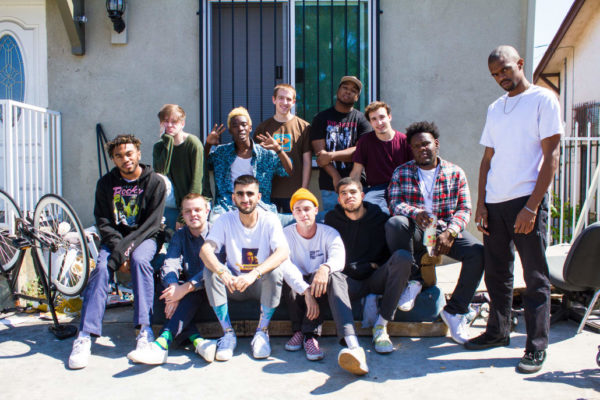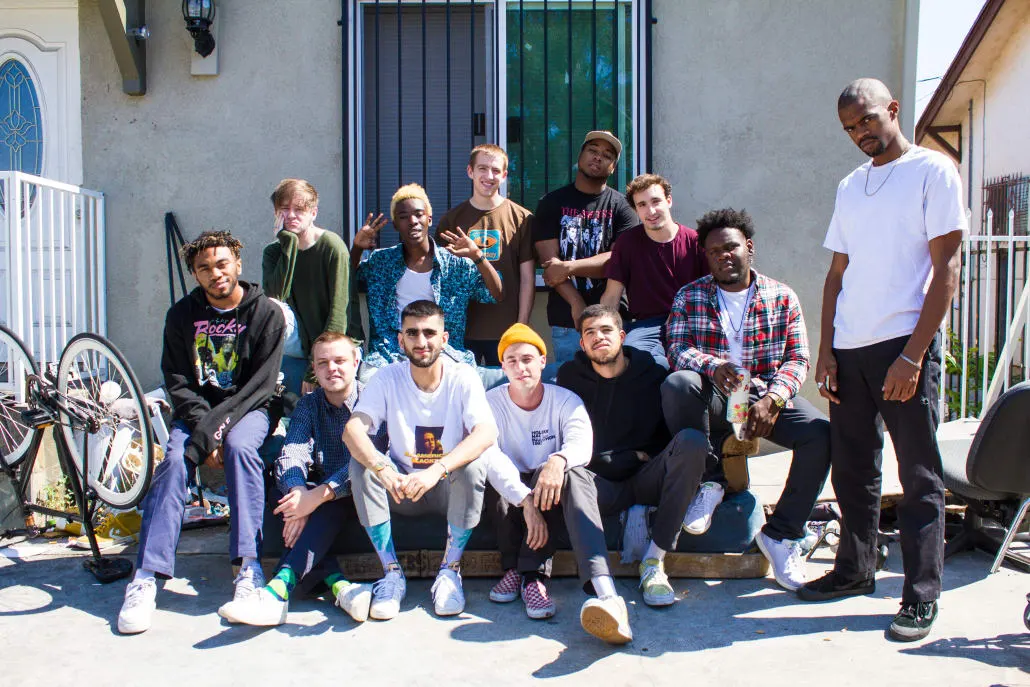
Last week, BROCKHAMPTON stormed Camp Flog Gnaw painted blue, pompously rapping their truth to a crowd of thousands, but just a year ago, their dreams remained locked away behind starry eyes.
Rather explosively, BROCKHAMPTON has taken over as indie hip hop’s darling, thanks in part to their consistently enthusiastic fan engagement and acclaimed releases of SATURATION & SATURATION II last summer. Many publications thus far have classified this group as what they appear on the surface, a rap collective, maybe the second coming of Odd Future if they play their cards right. However, the group insists that BROCKHAMPTON is a boyband, and I agree. For the Odd Futures of the world, the rap collective could be argued to be an entertaining promotion scheme for each of the artists involved. As seen in the demise of Odd Future in the wake of solo success for members like Frank Ocean, Tyler The Creator and Earl Sweatshirt, the endgame is a solo career. Collectives like A$AP Mob feature artists with loosely similar creative visions, but each artist retains too much of their individualism, and desire for individual success, to call the group’s work cohesive.
“The thing is about BROCKHAMPTON is that it’s a group,” explains creative director HK on the first track of the group’s debut mixtape, “ALL-AMERICAN TRASH.” BROCKHAMPTON, a collection of rappers and creators, rejects the concept of the rap collective. Off in South Central LA, the members of BROCKHAMPTON live together in a one-story house full of couches, dubbed “The BROCKHAMPTON Factory.” From ideation to promotion, this home remains at the center of it all, of their dreams and fraternity. The 15 creative members of BROCKHAMPTON constantly work off each other, seamlessly integrating each of their strengths into a solidly connected discography.
Though they are redefining what it means to be a boyband on the surface through a subversion of genre, like any boyband, BROCKHAMPTON’s goal is to open themselves up to their adoring, screaming fanbase. (Unlike many boybands, though, this vulnerability is authentic, produced sans focus group.) Each member has a story… and an archetype, so before they close out 2017 with the final installment of the SATURATION trilogy, let’s begin by meeting the founders of BROCKHAMPTON, 2017’s All-American Boyband.
Kevin Abstract — “The Leader”
As the founding member and creative frontman of the group, you can find Ian Simpson, better known by his stage name Kevin Abstract, involved in nearly every track BROCKHAMPTON releases. On top of his deeply personal lyrical matter, Abstract leads many of the group’s most infectious hooks, namely on “GOLD,” “SWEET,” “GUMMY” and “BOYS.”
Though he influences a lot of BROCKHAMPTON’s musical output, Kevin Abstract’s creative influences can also be seen throughout the visual aesthetic of the band, most notably in their music videos. In a documentary surrounding the release of “SATURATION,” Abstract details his fascination with cinematography and storylines and his desire to expand hip hop’s unique storytelling abilities into another medium.
Quite explicitly, Simpson’s lyrics explore his own identity, be it with coming to terms with his homosexuality on tracks like “JUNKY” as a member of BROCKHAMPTON and “Miserable America” as a solo artist. While an extroverted storyteller, Simpson holds his sexuality very close to his heart, submerging the listener in his own emotional experience. When listeners began asking him why he continuously rapped about his gay experience after the release of “SATURATION” and his recent solo album “American Boyfriend,” he came back on “SATURATION II”’s “JUNKY” and directly responded with “Why you always rap about bein’ gay? / Cause not enough n***as rap and be gay / Where I come from, n***as get called ‘faggot’ and killed.” Much like his LGBTQ hip hop contemporaries Frank Ocean, Syd and iLoveMakonnen, Abstract knows that his growing platform is an opportunity to speak out about the intersectional nature of his gay and black experiences.
Defining Line: “That n***a Kevin can’t rap, he too sappy with his shit / He don’t rep me with his shit, he on that teenage bullshit / And he ’bout 20 and shit? When he let go of that shit?” – GUMMY
Ameer Vann — “The Bad Boy”
As BROCKHAMPTON’s other founding member, Ameer Vann has one of the most distinctive voices and acts as the face of the SATURATION trilogy album covers so far. Of the bunch, Vann probably had the roughest path to fame, a fact he opens up about quite often in his verses. Before teaming up with Abstract to create BROCKHAMPTON, Vann admits he felt “lost.” He held various jobs to make ends meet, working in a slaughterhouse and collecting trash, all while running with a troublesome crowd. Fortunately, Vann eventually turned to Christianity and BROCKHAMPTON, climbing out of what he thought was an inescapable rut.
Vann’s confident, laid back flow deals with racism and run-ins with the law. Self-aware, Vann seems to rap as his past self on a lot of tracks, causing him to lead a pretty pessimistic view of the world. He trusts no one, frequently turning to vices to feign a brighter worldview. Like Abstract, Vann’s style and subject matter isn’t constrained to his BROCKHAMPTON work. Vann has quite a few popular solo singles to his name, like the elusively dark “High Tolerance.”
While Vann’s gritty realism acts as a foil to Abstract’s emotional idealism, both BROCKHAMPTON founders are rooted in the American implications of their own identities.
Defining Line: “I got my finger on the trigger, I’m a project baby / A free lunch felon, and I’m hungry every minute / Empty stomach, weed smoke can’t fill it” – “TEETH”
Through a Kanye West fan forum, Abstract and Vann assembled a team of diverse musicians with similar creative visions. After forming in obscurity in 2015, BROCKHAMPTON has controlled its own truth against the traditional music industry, subverting and redefining. They seize the title of boyband in the face of a pop music history of that term dominated by five-piece choreographed models singing glitzy tunes slickly manufactured in the studio and polished in focus groups. They release three albums in the span of six months without regard for drawn-out album cycles. They just create.
This is BROCKHAMPTON, 2017’s All-American Boyband.
“I’m going to say the name 1, 2, 3 times.
BROCKHAMPTON.
BROCKHAMPTON.
BROCKHAMPTON.”
—
Over the past few months, BROCKHAMPTON has developed into a self-made group to be reckoned with, developing a fanbase as raucous as Odd Future’s and as obsessed as One Direction’s. Though founders Ian Simpson (a.k.a. Kevin Abstract) and Ameer Vann control a fair amount of the group’s vision and image, much of BROCKHAMPTON’s musical and stylistic diversity comes from the rest of its main members. Let’s meet the rest of the boyband.
Matt Champion — “The Heartthrob”
On fourth track of the first SATURATION, Matt Champion wanted us to know that “low-key [he’s] a heartthrob and [he] ain’t drop an album yet.” Champion’s smooth, Drake-like flow touches the most on sex and relationships in the group. Rather than objectifying women as is common in some areas of hip hop and the entire music industry, Champion actually spends a few verses commenting on rape culture and toxic masculinity both in his life and hip hop, most prominently on “JUNKY.”
Defining Line: “I hate these shady folk that want a ladylike / But don’t treat lady right, but they be sayin’ like ‘just the tip’” — “JUNKY”
Merlyn Wood — “The Wild One”
Leaving architecture school to pursue his dreams with BROCKHAMPTON, the self-dubbed “ThatsSoMerlyn” brings the most energy to his verses, with a signature Ghanaian accent. Wood himself admits that he enjoys writing lyrics about his personal experience, even if it runs against he believes is hip hop’s convention to rap about “sell[ing] hella drugs and shoot[ing] people.”
Wherever he’s included, his erratic flow can up the track’s hilarity and urgency. As a contrast to Matt Champion’s calm delivery, Merlyn Wood’s wild delivery doesn’t follow any single blueprint, making each of his verses unpredictable and each of his featured songs exciting.
Defining Line: “Don’t call me stupid / That ain’t the way my name pronounced.” — SWEET
Dom McLennon — “The Older Brother”
The oldest rapper of the bunch, Dom McLennon bolsters Ameer Vann’s aggression with some added cynical sarcasm. McLennon’s maturity and previous solo endeavors lend greatly to his technical proficiency, most notably in his verses on “SWAMP” and “HEAT.” McLennon is also quite vocal about mental health on and off his verses, a refreshing take in an industry and overall society that tends to overlook the grave consequences of mental illness.
Defining Line: “Talking ’bout release dates, I’m trying to make it to tomorrow / Internal honesty could be the hardest pill to swallow.” — HEAT
JOBA — “The Baby Brother”
Despite his baby face, JOBA has been in the music game for quite a few years. Before he broke with BROCKHAMPTON, he struggled as a musician, as detailed in his monster verse in “SWEET.” Usually, JOBA throws in vocal harmonies to Kevin Abstract’s hook, adding to the cohesive musical feel of the group. Though he doesn’t normally rap, he has adapted to a heightened vocal role in the group, mixing his Timberlake-esque vocal style with traditional rapping cadences. While JOBA has taken on an increasing amount of the group’s melodic performances, he also handles production, mixing and mastering on all of BROCKHAMPTON’s projects.
Defining Line: “One might say I was doomed from the get-go / But those same people assume, ’cause they’ll never know / What it’s like to be called to what’s not set in stone / I am one with the ebb and flow, that’s all I know” — SWEET
bearface. — “The Shy One”
Never rapping, bearface is a loner within this tight-knit group, writing and producing completely separate tracks that close out each album. Performing alone on record and onstage, bearface is able to channel the melancholic nostalgic crooning of a Blonde-era Frank Ocean. His two closing tracks “WASTE” and “SUMMER” are both reminiscent of Ocean’s “Godspeed” and “Self Control.”
Defining Line: “Was I more than it’s worth / Or will you see my name and I’ll fade?” — WASTE
Behind the Scenes: While BROCKHAMPTON is perhaps best known for its colorful cast of rappers, their distinctive sound and creative aesthetic — including their inventive music videos — would not be the same without the producers and creative directors associated with the group.
Romil Hemnani — Producer, DJ
Hemnani is behind a vast majority of the beats in BROCKHAMPTON’s and Kevin Abstract’s discography, including BROCKHAMPTON’s hit “GUMMY.” While the group is on tour, Hemnani acts as the group’s DJ.
Q3 [Jabari Manwarring & Kiko Merley] — Producers
Usually working together under the moniker Q3, Manwarring and Merley have collectively produced some of BROCKHAMPTON’s biggest hits, like “GOLD,” “STAR” and “SWEET.”
HK — Creative/Art Director
At the head of much of the visual art surrounding BROCKHAMPTON’s image, Henock “HK” Sileshi controls BROCKHAMPTON’s inseparable visual aesthetic. While he collaborates with Kevin Abstract on the general vision of the group’s visual identity, HK follows through by directing music videos and creating the graphic designs seen across BROCKHAMPTON’s website and album artwork.
With all the interlocking talents of BROCKHAMPTON, you can witness all members’ best work on display here.
BROCKHAMPTON plans on releasing “SATURATION III” before the year goes out and will begin their “Love Your Parents” tour mid-January. Catch them in San Francisco on March 3 at The Warfield.
Contact Dylan Grosz at dgrosz ‘at’ stanford.edu.
